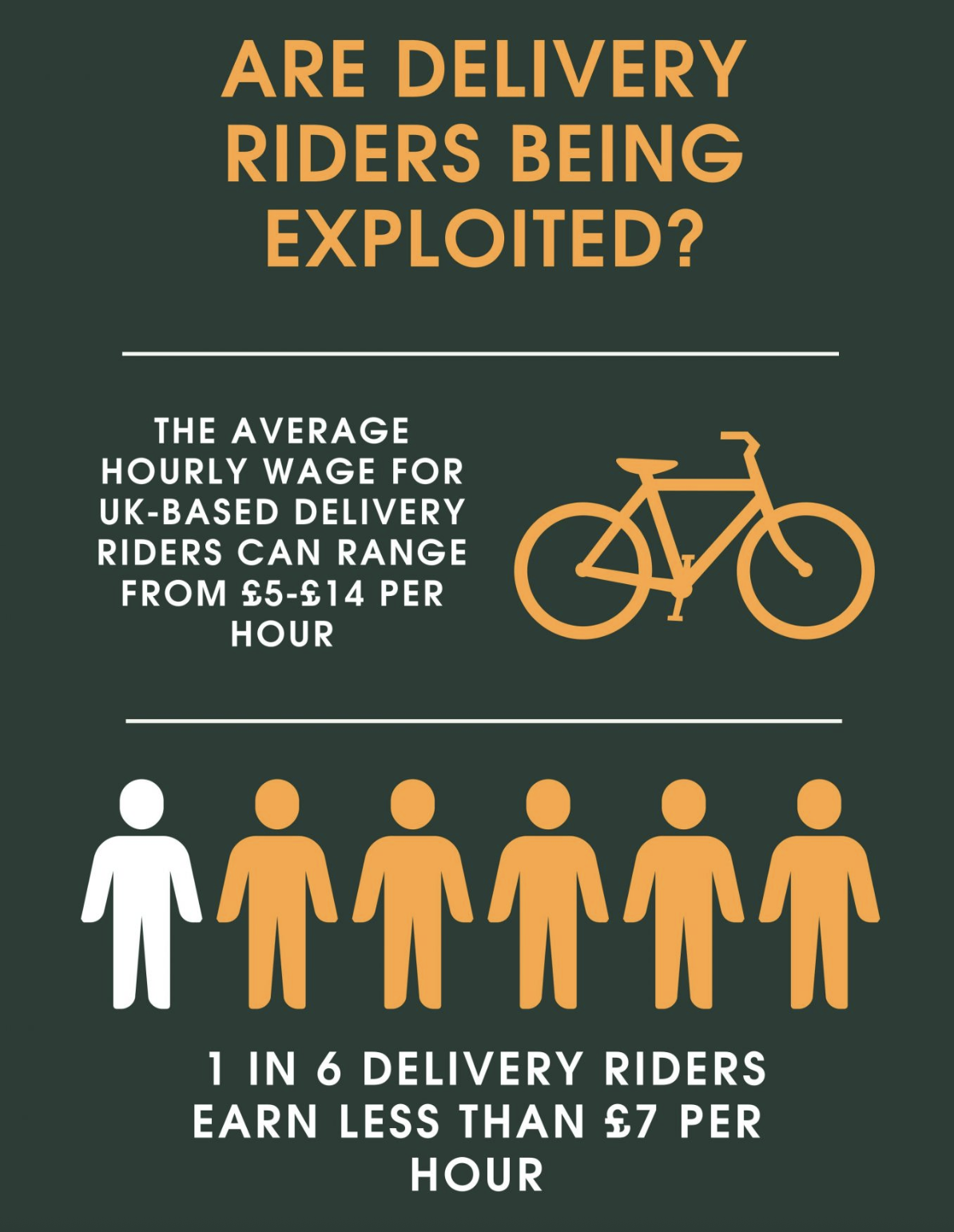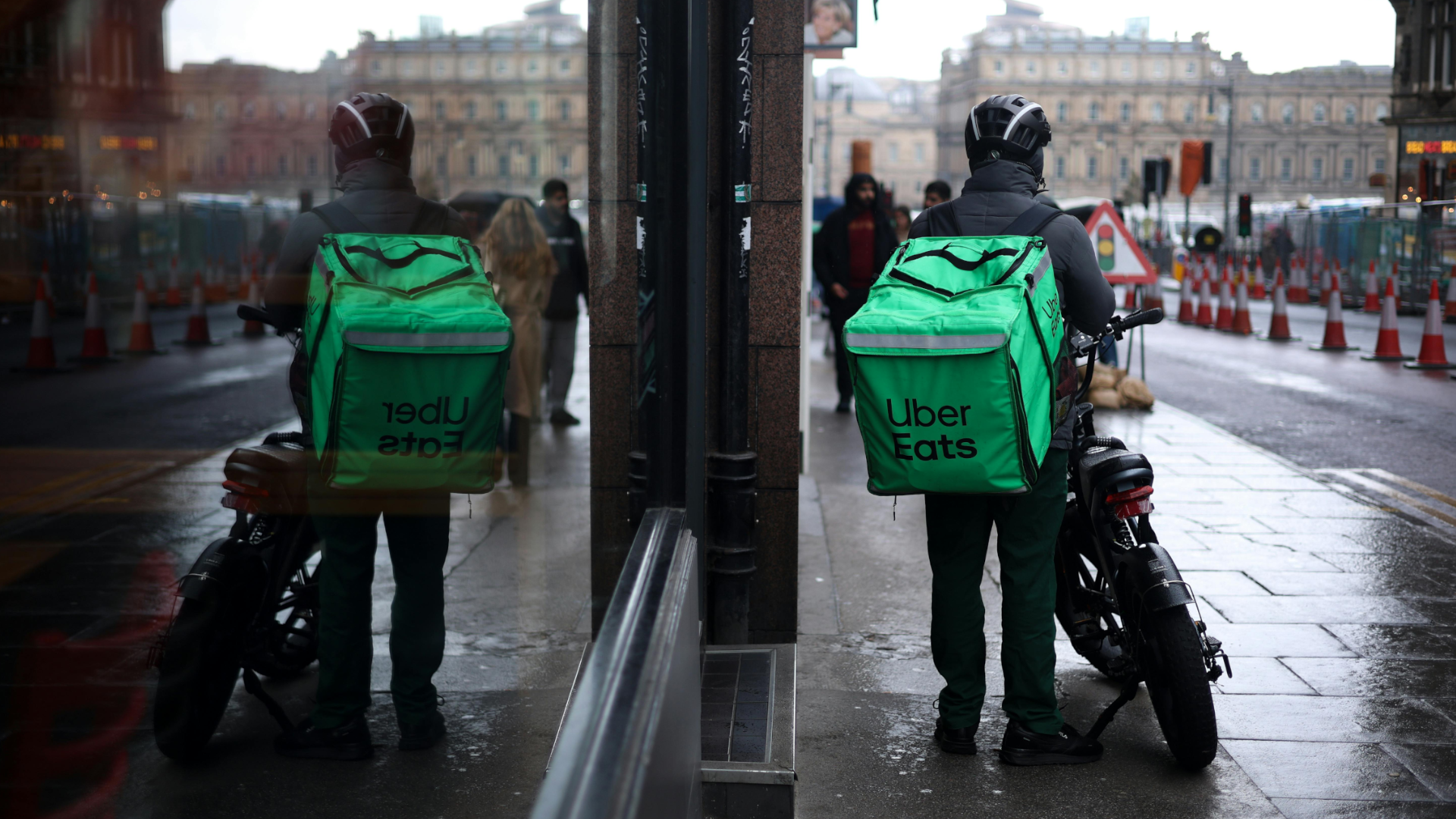The prosecution of e-bike riders for speeding is symptomatic of a wider problem of wealth inequality and a lack of worker’s rights.
If you’ve been anywhere near a city in the last decade, undoubtedly you’ll have seen them. In Newcastle they’re often locked up or propped up on their owner on Northumberland Road, just off of Northumberland Street.
Their riders tend to congregate within the vicinity of fast food restaurants, a deliberate location which allows fast pick up and delivery before returning to the inevitable state of stasis between jobs.
In the gig economy, speed is of the essence.
Like other gig economy workers, the wages of delivery drivers are supplied by an intermediary platform. Some of the most well known include Deliveroo, Uber Eats, and Just Eat.
This system means that although their labour is technically legitimate, the platform that sells the labour of their workers usually takes a significant cut. Only the other day an Uber driver was telling me that he now works 6 days a week instead of 5, and earns £300 less than he used to, because Uber has started taking 40% of what he earns per trip.
The result is that although ‘the number of couriers on our roads has increased rapidly’ with the exponential rise of this industry, the value of this labour has gone in the opposite direction.

As more people become available for this kind of work, the lack of demand for employment means that wages can remain paltry, or decrease. Although it was just a little over a decade ago when Deliveroo first began offering multi-venue take out services in London, the appetite it wetted for convenience has only intensified since.
The solution to this need to feed at a pace faster than the average bike will allow, then, is the use of the e-bike. As a mode of transport that allows riders to cover long distances with minimal effort, which needs neither an expensive motor nor insurance to run, it’s easy to see why they’ve become a cornerstone of the takeout delivery business.
The ability to use your own, or a mate’s, vehicle, with little to no right-to-work checks, also means that people without, or awaiting, a right-to-work status often occupy delivery-driver roles since generally the gig-economy is more accessible than other forms of employment.
UberEats increases the costs of menu items so they can skim off the top, has increased delivery fees and added “service” fees on top of that. Then, because we have a conscience, WE have to make sure the workers get a liveable wage by tipping (which they also steal from workers)
— emotionally intelligent papi 🌻 (@julianakilrose) December 24, 2021
However, the flexibility and convenience this affords the worker also means that often vulnerable individuals are subject to a lack of stability, uncertain hours, and low wages (often paid per delivery rather than per hour) as competing businesses and platforms will often try and undercut one another in order to make a profit.
In a 2021 Bureau of Investigative Journalism report, it was revealed that some Deliveroo riders were earning less than £2 an hour. In the same year the company’s founder Will Shu received a £500 million one-off payment.
Two years later, the UK Supreme Court ruled that Deliveroo drivers were not entitled to unionising or collective bargaining rights on the basis that they could ‘arrange a substitute to perform their duties if they did not want to or were unable to [work].’
For a long time we’ve been aware that this is the case. If you’ve ever ordered a hangover takeaway or gotten an Uber home after a late shift, or if you’ve had an e-bike rider with a cuboid shaped backpack zoom past you, you’ve likely put two and two together.
Once conspicuous leisure has since retreated behind closed curtains and beneath a quilt. It’s become notable only through its subsequent digital documentation and the slither of light that appears briefly between door and frame, punctuated by an arm clad in jersey fabric, connected to an outstretched hand, expectant and grasping for the paper bag of carbs retrieved from the back of an illegal vehicle.
With the hostile way that the UK home office treats migrants, subjecting them to impersonal processing systems and unnecessarily long waits for a right-to-work VISA with no subsidisation in the meantime, it’s no wonder that many people in the accessible gig economy are from non-UK backgrounds.
This type of labour forces people to accept unstable work in case a background check could result in their displacement to somewhere that is possibly less safe with fewer opportunities for them to be able to support their families.
Otherwise, this type of labour is relegated to migrant workers imported from poorer countries to fill the gap created by people on higher salaries who have neither the time nor the willingness to carry out indirectly market-mediated labour. Why would they, when our society values productive labour over commodified service work?
The hegemonic rhetoric seeks to convince us that there’s no point cooking when you can have someone deliver your dinner to your door in less than 30 minutes.
Like the disconnect between the meat people see on their plates and the once live animal that it comes from, the only way this capitalist system works is if people conveniently forget about the people who carry out the undervalued labour which forms the backbone of capitalist society.
It is this very labour which, paradoxically, is what enables them to live the often privileged lives that they lead.





















